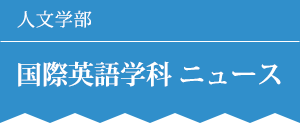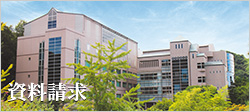This has been an extraordinary year, and all throughout the university, fourth-year students have been working hard to finish their graduation theses. I think I can speak for all students and staff when I offer heartfelt congratulations to all of them for finishing their various projects under difficult circumstances. Today was an especially enjoyable day because the 4th year GSE students gave presentations about their theses. In this article, I'll speak to four of those students, and as you'll see, there was a diverse range of topics, and the presentations themselves were really interesting. I asked them all to share their ideas and experiences related to their research, and also to their feelings about graduating in general.
(今年度は、新型コロナウィルス感染症の影響により困難な状況が続きましたが、そのような中で4年生はそれぞれの卒業研究に取り組み、論文を完成させました。GSEの学生は、毎年卒業論文発表会で研究内容の口頭発表と質疑応答を行います。そこでこのウェブニュースでも、発表会を終えたばかりの学生たちに彼女たちの研究の取り組みについて2回に分けて紹介します。今回紹介する4名の学生は、子供の貧困、女性の人権問題、性教育、人身売買といったテーマに取り組みました。)

The conference was held online, but thanks to the guests and speakers, it was fun, informative, and interactive.
(今年度の卒業論文発表会はオンライン・ミーティングの方式でしたが、下級生や教員も参加して質疑応答も行いました。)
First, I spoke with MI, who is soon to become a teacher.
In my thesis, I wrote about child poverty in Japan and in Vietnam. I investigated the unique characteristics of each context, as well as what policies and measures are being implemented at present. My main aim was to find better ways to solve these important problems. As I was writing, I came to understand again the human impact of poverty, and how it affects children. Poverty deprives innocent children of their freedom, hopes, and their futures. However small, I was determined to find some way to help to bring back their smiles. In researching and writing, I had to read and understand a lot of academic texts in English, and although never easy, I could do it thanks to the abilities I acquired over four years at university, as well as the support from teachers and friends. This experience will help me to work hard on other long-term projects when I graduate from university.
(私は卒業論文のテーマとして「日本とベトナムの子供の貧困」について書きました。この2つの国における子供の貧困の特徴は何か、また現在どのような対策が実施されているのかを調べました。さらにそれらのことから、今後どのような解決策をとるべきなのかを研究しました。卒業論文を書いていく中で、貧困問題の悲惨さ、また貧困がどんなに子供に影響を及ぼすのかを改めて痛感しました。貧困は罪のない子供たちの自由や希望や未来を奪います。彼らの笑顔を取り戻すために、小さなことでも私ができることはしていこうという思いが強くなりました。この論文を書くにあたって、多くの英語で書かれた論文を読み、そこから自分なりに分析をしてきました。この作業は決して容易なものではありませんでした。しかし、大学4年間の間で身につけた力、いつも私を支えてくれる先生や友達のおかげで満足するものが書けました。この経験を活かして、大学を卒業した後も様々なことに取り組み、頑張っていきたいと思います。)
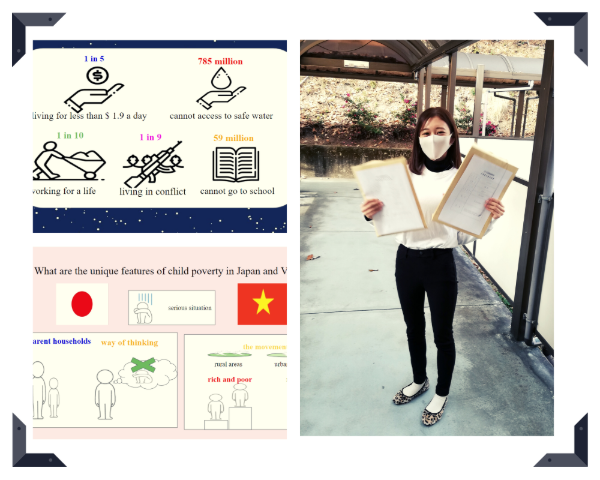
MI: "I could do it thanks to the abilities I acquired over four years at university, as well as the support from teachers and friends"
Next up is MK, and as you'll see, she has a lot of interesting things to add.
(二人目のM.K.さんもまた、興味深い研究内容です。)
I wrote my thesis on the topic of FGM (Female Genital Mutilation), which is a global-scale problem, with a focus on the cases of Egypt and Indonesia. My main areas of inquiry were understanding why these countries have a comparatively much higher prevalence of FGM, what the unique characteristics of FGM in each country are, and understanding and improving upon the solutions being tried at present. This meant finding and analyzing information at the international, governmental, and local community levels. Currently, there are more than 30 countries, mainly in Africa, the Middle East, and Asia, where FGM is performed as an important part of the culture and/or religion of communities, amounting to a total of around 200 million women and girls. Through my research, I found that female genital mutilation is cruel, and that many international organizations, NGOs and NPOs are trying to eradicate it, seeing it as an inhumane act from the viewpoint of health and human rights. I understand this perspective, however, contrary to that thought, in the countries and regions where female genital mutilation is performed, it is deeply rooted in people's lives as a part of their religion and culture, and so understandably, they value it, and are quite often proud of it. The culture and understanding of female genital mutilation vary from country to country, and measures and solutions tailored to those differences are therefore needed. Both knowledge about and action against this problem are necessary. An important aspect is raising awareness because by ensuring as many people as possible understand the issue, we can begin to find solutions. Although I faced many challenges in researching and writing my graduation thesis, with the support of teachers, I was able to do it. I was mainly concerned about my lack of concentration, but with the encouragement of those around me, I was able to work hard. I am grateful to the people who helped me, especially my teacher.
(私は世界規模で行われている "FGM (Female Genital Mutilation)"、いわゆる「女性器切除」について、エジプトとインドネシアのケースを中心に卒業論文を書きました。なぜインドネシアとエジプトでは他の国より女性器切除が多くの少女に施されて来たのか、それぞれの国の「FGM」はどんな特徴があるのか、そして "FGM" という問題に対する改善策・解決策を国際レベル、政府や団体、地域コミュニティレベルで調査し、分析しました。女性器切除を国や宗教、地域の大切な文化として行っている国は現在、アフリカや中東、アジアを中心に30ヵ国以上あり、人数にして約2億人の女性や少女たちに実行されています。調査を進めていく上で、女性器切除が残酷なものであること、健康面や人権の観点からも多くの国際機関やNGO・NPO団体がそれを非人道的行為として根絶しようと試みていることが分かりました。しかしその思いとは裏腹に、女性器切除が行われている国や地域では宗教や文化として人々の生活に深く根付いていること、そして、それらの行為は彼女たちにとっては誇り高いことでもあることが分かってきました。国や地域によって女性器切除の文化や理解は異なり、それに応じた対策や解決策が必要です。そして、解決するためには私達がこの女性器切除問題を「知る」こと、「行動する」ことが大切です。一人でも多くの人がこの問題について知って、考えを拡散することによって、女性器切除への問題意識が高まり、解決へと導きます。卒業論文を進めていく上で、多くの困難がありましたが、先生の支えもあって書き上げることができました。私は主に集中力が続かないことに頭を抱えていましたが、周りの励ましもあってしっかり取り組むことができました。私のために力を貸してくれた人達、特に指導教員の先生に感謝しています。)
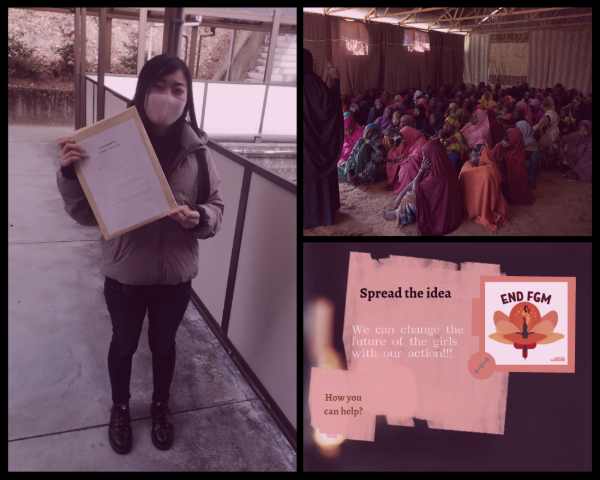
MK with her thesis. Guests at her presentation expressed their surprise at how big a problem FGM/C is, and I think many of us were learning about this issue for the first time.
Next, I spoke with TK, who will actually be returning to HJU next academic year as one of our graduate school students.
(次にご紹介するT.K.さんは、卒業後広島女学院大学大学院に進学する予定です。)
I researched the topic of sex education policies in Japan. I investigated and talked about the pervasive view of sex and sexuality in Japan as a taboo, how it is rooted in the culture and society of Japan, and the various problems this causes. One aspect of my research is the difference in how certain things related to sex are viewed within and outside of Japan, and I was shocked by much of what I learned. This research, as with other times in my studies, made me reflect on the problems facing Japan, and what my generation can possibly do about them. 2020 has been a hellish year, since last year, due to the global COVID-19 pandemic, and I spent half of the year at home. As well as having to write my thesis, I had other problems at home, which was a challenge psychologically. However, thanks to the support from people around me, I was able to get back on track. I am grateful for the reassurance and empathy I received, and proud to have successfully completed my thesis.
(私の卒業論文のテーマは「日本と性教育の教育方針問題と課題」です。昨今の日本における性に対するタブー視、そしてそれによって引き起こされている様々な問題を、日本という国の文化・特徴を踏まえて調査し、論じました。卒業論文を書くにあたっての長期間の調査で、日本国外から見た日本と、日本国内における日本へのイメージなどがかなり異なっている部分があり、中には衝撃を受けるような内容もあり、色々な感情を抱きました。改めて自国の抱えている問題や、私達の世代で可能なことは変えて行きたいという気持ちを改めて感じました。私の2020年は地獄のような年でした。新型コロナウイルス感染症の世界的な拡大で、1年の半分を家で過ごしました。そのため、卒業論文に取り組む以外にも身近に様々な問題があったので、途中書くことが精神的に難しかったです。しかし、その時の私を支えてくれた人がいたお陰でなんとかまた書き始めることができました。しんどさを感じながらも、支えてくれる人がいるありがたさと心強さを学びました。無事に卒論論文を完成させることができた自分を誇りに思います。)

TK: "I am grateful for the reassurance and empathy I received". In a difficult time, the safe and friendly family atmosphere at HJU is a good place for students to be in.
In our final contribution of this first part, we hear from NM.
(前半回の最後は、M.K.さんの研究を紹介します。)
I wrote my graduation thesis on the subject of human trafficking in Cambodia and Myanmar. I explored the causes of trafficking in those countries, examined what types of trafficking take place, and what kind of people are deceived and harmed. My thesis also outlines how the trafficking problem should be addressed locally, nationally, and globally. When researching and writing about this topic, I realized the heartbreaking reality faced by those who cross borders, and also, the sad fact that this is a largely unacknowledged problem. I sincerely hope that as many people as possible will look at this reality, and hope that as many victims as possible can be saved in the future. Completing my graduation thesis among the storm of the new coronavirus was tough for me. I often went to cafes because it was difficult to work on the project at home, but I was stressed to go outside. However, I was able to experience the joy of reading and writing in English, and learning new things, as I proceeded with my graduation thesis. I am grateful for this wonderful opportunity to develop and grow.
(私はカンボジアとミャンマーの人身売買についてをテーマとして卒業論文を書きました。二つの国でなぜ人身売買が起こるのか原因を探り、実際に人身売買にはどのような種類があり、どのような人々が騙されて被害に合うのかについて探求しました。また人身売買についての問題が地域、国、世界でどのように対処されるべきなのかを解決策としてまとめました。このテーマで卒業論文を書いていくにあたって、国境を超えるだけでこんなにも心が痛くなるようなことが実際数えきれない程起こっていることを知りました。さらにそれがあまり公に発表されていない悲しい事実を知りました。この現実に一人でも多くの人が目を向け、一人でも多くの被害者を救える希望の溢れる未来になることを心から願います。卒業論文をこのコロナ渦で完成させるということは私にとって過酷でした。家で課題に取り組むことが困難だったため、私はよくカフェ等へ行って課題を行いましたが、感染に気を付けながら外出することにストレスを感じました。しかし、卒業論文を進めるにあたって英語で文献を読み、論文を書くこと、新しい知識を学ぶことの楽しさを深く実感することができました。自分自身を大きく成長させてくれたこの素晴らしい機会に感謝しています。)
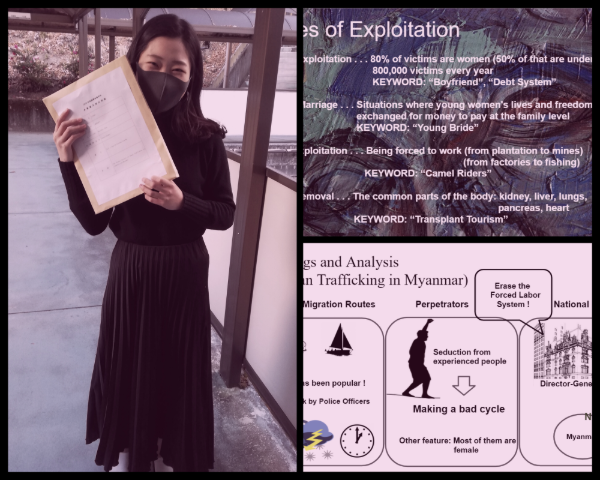
NM: "the sad fact [is] ... that this is a largely unacknowledged problem"-The audience learned a lot from NM's presentation.
Well, it's been fantastic to hear from these four students. In the second part of this article, we'll hear from the other 4th year GSE students. But, for now, many thanks to these four for sharing their research, talking about their experiences, and of course, their bright futures. If you're a current or future student at HJU and are thinking about your own thesis, don't miss the next article, because it will include some great advice from these students, as well as their classmates. Best of luck in the future guys!
(現代の社会問題に真摯に取り組んだ、彼女たちの研究内容や研究を進める中での経験談はいかがでしたか。今現在学生の皆さんにとっても、大学での学びや研究の参考になったと思います。後半ではさらに4名のGSE学生による卒業論文を紹介します。)
